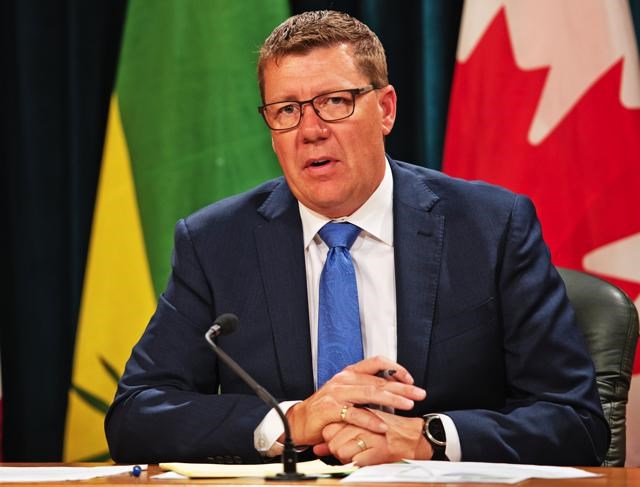How will the COVID-19 pandemic and the government’s response to it factor into the coming election? That question was posed to both the NDP Leader, Ryan Meili, and Sask Party Leader, Premier Scott Moe on Sept. 22.
Moe, speaking at the regular COVID-19 press conference in the Legislature said, “You know, I guess our response has been, whether it be in the budget, whether it be in the decisions that we make on advice we received from Dr. (Saqib) Shahab, whether it be on the advice we received from MLAs, and the people across this province, that will ultimately be part of the decision-making process for the people. How have we conducted ourselves as their representatives in government? I would expect that would be part of the decision-making process.
“I would also say that another part of the ballot question, if you will, as we move towards an election on October 26 will be, quite frankly, who you trust to recover the economy of the province of Saskatchewan? That is a question that I think many Saskatchewan people will be asking themselves over the course of the next number of weeks. That is a question that we will be asking people in this province over the course of the next number of weeks,” said the premier.
“It is election season. New Brunswick has run their election, and B.C. has called their election for a couple days before ours will be held here in Saskatchewan. We look forward to going out and asking people to support a fourth mandate.”
Meili was on the campaign trail, travelling between Melfort and Prince Albert. He said by cellphone, “I think the one thing that was really interesting to me, in recent weeks, the government clearly didn't do their job when it came to preparation for the schools. They took the summer off, they released a plan that was empty and was inadequate. And they then scrambled at the last minute, had to delay the school year, and still left all the decisions up to school divisions, even individual classrooms. And that has been very frustrating and anxiety-producing for parents, teachers, and everyone with a connection to the school system.
“And it's interesting; before then, and I think naturally and positively, there was a there was an attitude of ‘We're all in this together. Let's rally around the flag. Let’s support the government of the day.’ I think that message from the government, that they weren't going to step up, when they're asking everyone else to step up, really opened the door for more criticism. And now I'm hearing a lot more people questioning the management of the pandemic, but also this notion, going forward, that the response would be cuts.
“This is not a time for us to be cutting health care and education, it’s a time for us to be investing in people. If we don't, our economy will slow down, and people will hurt. And this message of austerity from Premier Moe is absolutely the wrong direction.”
Asked if he plans to make the pandemic an election issue, Meili said, “I think it will be, no matter what. And, you know what I will really be focused on is, how do we recover?”
Meili went on, “There’s no way it cannot be. But what we need to talk about is how do we come out of this as strongly and successfully and as positive as possible? How do we take care of the people in the province? And how do we get our economy moving again? And that’s where you see the really clear choice and the really clear distinction between the Sask. Party and the NDP, where theirs is a message of austerity, of cuts, belt tightening, versus what we think needs to happen, which is targeted investments in the things that will grow our economy and improve people’s lives.
“And that’s where we get into a lowering of class sizes, making affordable childcare a reality in this province, bringing in the best home care in Canada, focusing on Saskatchewan workers when it comes to who gets jobs in major projects. That’s where you'll see the real big difference. And that’s where people will have a very clear choice in this election.”
With regards to austerity, when asked where the money will then come from, Meili responded that, in comparison to the 1990s, when the then-NDP government made many cuts in its budgets, “Where we’ve seen cuts, it hurts people and it slows down the economy. We know more about that than we did in ’92. The other thing is we’re not facing the interest rates that we were facing in the early 90s. We actually can borrow quite cheaply now. And if we put that money in the right places, use those dollars to grow more quickly, then the interest we’re paying.”
He said the situation is different now, as the 1980s Conservative government had bankrupted the province and Saskatchewan was at risk of being unable to sell its bonds. “This is the time to make the right investments and the right choices, so we don’t find ourselves a few years from now as bankrupt as we were when Mr. Romanow had to take over.”



